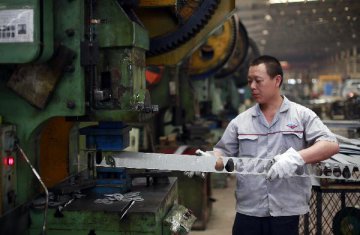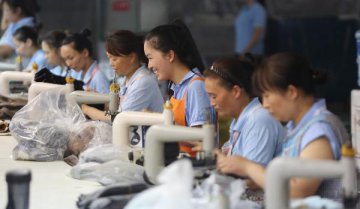
Tax cuts in China could be at the center of Beijing's fight against a slowing economy amid an ongoing trade spat with the U.S., experts said.
"Fiscal policy will be the front line of defense against mounting macroeconomic headwinds in 2019," Haibin Zhu, J.P. Morgan's chief China economist, wrote in a recent note.
The challenges in China's economy are already starting to show. On Monday, Beijing reported its slowest GDP growth in decades, with official data showing that the economy grew 6.6 percent in 2018 compared to a year ago — it's slowest rate of expansion since 1990.
That comes amid signs of softening demand — with recent data pointing to weaker exports and a slowdown in manufacturing activity — as the trade war with the U.S. appears to be taking a toll. Analysts such as Zhu say that Beijing will need to turn to fiscal measures, which typically means boosting government spending and cutting taxes, in order to stimulate the economy.
Earlier this month, the Chinese finance ministry said the country will boost fiscal expenditure and implement larger tax and fee cuts in 2019. Those cuts will focus on reducing burdens for small firms and manufacturers, the ministry said.
Already, Chinese authorities have announced cuts in individual income taxes and tariffs, and higher tax rebates for exports, noted J.P. Morgan's Zhu. He said he expects overall tax cuts to be "sizable," reaching 2 trillion yuan, or 2 percent of GDP.
What may happen
While the Chinese government favored spending on infrastructure as a fiscal stimulus in the past, that led to a sharp rise in local government and state-owned enterprise debt — which Beijing has been trying to keep under control.
So the "the major fiscal effort will be tax cuts this year," Zhu said. "The government has grasped the problem and is adopting a different style of fiscal stimulus: tax cuts, for both households and corporations," he added.
Particularly significant would be a cut in VAT, or value-added tax, that's expected to take place before the annual National People's Congress meeting in March, said Hao Zhou, senior emerging markets economist at Commerzbank. VAT is China's largest tax revenue category.
"That will be very important and significant to the market," said Zhou, who added that VAT accounts for one-third of China's tax revenue.
Some say, however, that tax cuts could be of limited impact to GDP growth, and Bo Zhuang, chief China economist at TS Lombard, said they may even take six to nine months to create results.
Beyond changes to the tax regime, Chinese policy-makers have already been taking steps to ease monetary policy — including reducing the amount of money banks need to set aside as reserves at least five times in the past year — but those measures have been limited. Beijing has been trying to rein in debt, but a system full of cash would be counterproductive as it encourages debt-laden businesses to borrow more.
There's also the risk of capital outflows should the Chinese yuan lose its value in an easing exercise, Zhu added.
Source: CNBC
























Latest comments